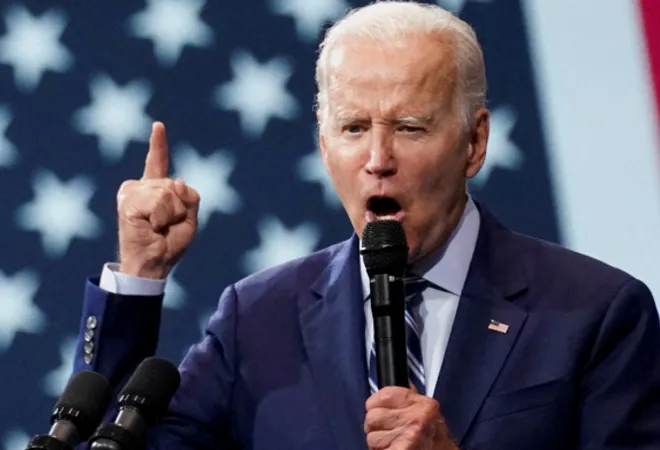US President Joe Biden’s second Democracy Summit last month garnered significant international attention but has also raked up divisive political debates around democracy itself. The most prominent one being the democracy vs autocracy debate – arising out of the American compulsion to distinctively demarcate democracies from other forms of government and a definitional compartmentalisation of democracies and autocracies. Furthermore, Washington’s effort to strictly categorise nations intothis binary has also involved use of metrics that do not conform to all democracies in the world, more so in the Global South. As such, there is a grey zone in the evolutionary space for democracies which needs to be taken cognisance of.
Within the larger context of democratic discourse, such categorisation raises questions about various ‘non-conforming’ systems of governance in the world: First, which countries can be considered democracies? Second, how well-placed are the ‘autocracies’ to challenge the hegemony of the democratic nations and whether they do have the capacity to do so? In the broader subset, many are functional democracies but not percieved as one; quite a few are between being a democracy and an autocracy, while others still are functional democracies with occasional streaks of autocratic rule. Essentially, there shouldn’t be a sanctimonious hierarchy of democracies, as even the holiest claimants can be pointed to have autocratic streaks in pockets.
The primary reasons for the US to work through this binary are: First, it shines a light on non-democratic governance and practices, most prominently China. Second, it seeks to build a coalition of democracies, particularly in the Indo-Pacific region for collective advantage against China in trade, security and influence. Besides, at the level of international governance such as through the UN, such a coalition can help push the envelope on matters of global security and governance.
The invitee list for the summit showed contradiction and was ambiguous about the criteria to qualify as a democracy. Countries like Israel, Saudi Arabia, Brazil and Mexico were invited. Pakistan, following its stance on the invitation for the last summit, abstained. Countries that did not make the invitee list included Congo, Iraq, Angola, China, and Russia. China counterattacked over its exclusion from the list of invitees for the first summit, claiming to be a democracy. This establishes that there is no perfect model for democracy and a foregrounding of democracy as well as avoiding the label of autocracy adds to the validation of governance in states.
Addressing the second concern in the binary is far more difficult as it would highlight authoritarian strains present in all democracies. Moreover, democracy is to survive in a reality where engaging with actors which do not subscribe to the democratic ideals in totality becomes crucial for making headway on global issues. This puts forward the conundrum of how serious democracies are about democratic governance.
Democracies have not always been true to the ideals they promote and it is precisely because of their ambitions that such ideals have taken a backseat. Starting from the making of the global order since the end of WWII by crafting global institutions favourable to the liberal Global North while impinging upon the preferences of the newly decolonised countries in the Global South, to the recent interventionist policies by the US and Europe, the West has failed to align its rhetoric with reality. America’s hegemonic actions have been criticised by countries over the years. It’s because of this undemocratic hegemonic behaviour perhaps that countries have sought to broaden their spectrum of foreign engagements by establishing ties with other rising powers around the world. The two powers that have posed a challenge to US hegemony are Russia and China. Both these countries have been classified as autocracies by America.
Biden’s democracy summit, which relies on the power of democracies and seeks to counter autocratic behaviour, is a means to reinvent US leadership in a world threatened by the growing divide between the West on the one side and Russia and China on the other. The summit sought to prove US commitment to democracy in the light of the Russia-Ukraine war and China’s influence across the globe. America depicts democracy to be the common value on which relationships can be built and strengthened but much global cooperation remains strategic and beyond the consideration of ideals supported by the West.
This commentary originally appeared in Deccan Herald.
The views expressed above belong to the author(s). ORF research and analyses now available on Telegram! Click here to access our curated content — blogs, longforms and interviews.

